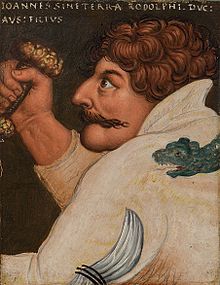John Parricida
| John Parricida | |
|---|---|
 | |
| Born | John of Swabia ca. 1290 |
| Died | 13 December 1312/13 |
| House | House of Habsburg |
| Father | Rudolf II, Duke of Austria |
| Mother | Agnes of Bohemia |
John Parricida(German:Johann Parricida) orJohn theParricide,also calledJohn of Swabia(Johann von Schwaben), (ca. 1290 – 13 December 1312/13) was the son of theHabsburgdukeRudolf II of Austriaand Agnes, daughter of KingOttokar II of Bohemia.By killing his uncle, KingAlbert I of Germany,he foiled the first attempt of the Habsburg dynasty to install a hereditary monarchy in theHoly Roman Empire.
Life[edit]
John was born shortly before or after the death of his father Rudolf II, the younger son of KingRudolf I of Germany.His mother was Agnes, daughter of KingOttokar II of Bohemia.He passed his early days at theBohemiancourt and the town ofBruggin theSwabianhome territory of the Habsburgs, where he is mentioned as titular duke in a 1294 deed.

As John's father had been forced to waive his right to the Habsburg duchies ofAustriaandStyriain favour of his elder brother Albert I according to the 1283Treaty of Rheinfelden,he felt deprived of his inheritance. When he came of age, he demanded a portion of the family estates from his uncle, who had finally prevailed in theelectionas King of the Romans againstAdolph of Nassauin 1298. His wishes, however, were not gratified nor did he receive any of the compensations in the Swabian territories ofFurther Austria,awarded to his father by the Rheinfelden Treaty. In 1306, King Albert even placed his son, DukeRudolf III,on the Bohemian throne, denying his nephew's right of inheritance. Thereupon John, mocked as "Duke Lackland" (Hertzog Anlant), with several companions of Swabian nobility formed a plan to murder the king.
A Habsburg family banquet inWinterthur,held by Albert on the evening of 30 April 1308, gave rise to a scandal, when the invitee John rejected a floral wreath offered by his uncle, exclaiming that he would not be fobbed off with flowers. The next day, King Albert on his way home became separated from his attendants when crossing theReussRiver nearWindisch,and was at once attacked by John and his conspirators. John rode toward his uncle and split his skull without a word. He escaped the vengeance of Albert's sons, and from that point his fate remained unknown. In the same year, theprince-electorschose theLuxembourgcountHenry VIIas Albert's successor, who placed John under theimperial ban(Reichsacht). John allegedly fled toItalyand found refuge in aPisamonastery, where, in 1313, he is said to have been visited by Emperor Henry VII. After the defeat of Albert's sonFrederick the Fairat the 1322Battle of Mühldorf,the Habsburg dynasty was not able to regain the German crown until the election ofAlbert IIin 1438.
Fictional character[edit]
The character of John is rendered byFriedrich Schillerin his 1804 dramaWilliam Tell:[1]John on the run arrives atTell'shouse begging for help and arguing that he had to take revenge on his enemy — like Tell on bailiffAlbrecht Gessler.Tell rejects the comparison but directs him to Italy, advising him to seek papal absolution.
John's fate was further perpetuated in the poemDer Graf von Thal(1838) byAnnette von Droste-Hülshoffand by the Austrian writer Johann Nepomuk Vogl, whose balladDer Mönch zu Pisawas set to music byCarl Loewe(Op. 114) in 1846. Historical dramas were written byAugust Gottlieb Meißner(Johann von Schwaben,1770) andJulius Grosse(Johann von Schwaben,1870).
Male-line family tree[edit]
Notes[edit]
- ^Act V, scene 2
References[edit]
- This article incorporates text from a publication now in thepublic domain:Chisholm, Hugh,ed. (1911). "John of Swabia".Encyclopædia Britannica.Vol. 15 (11th ed.). Cambridge University Press. p. 450.
